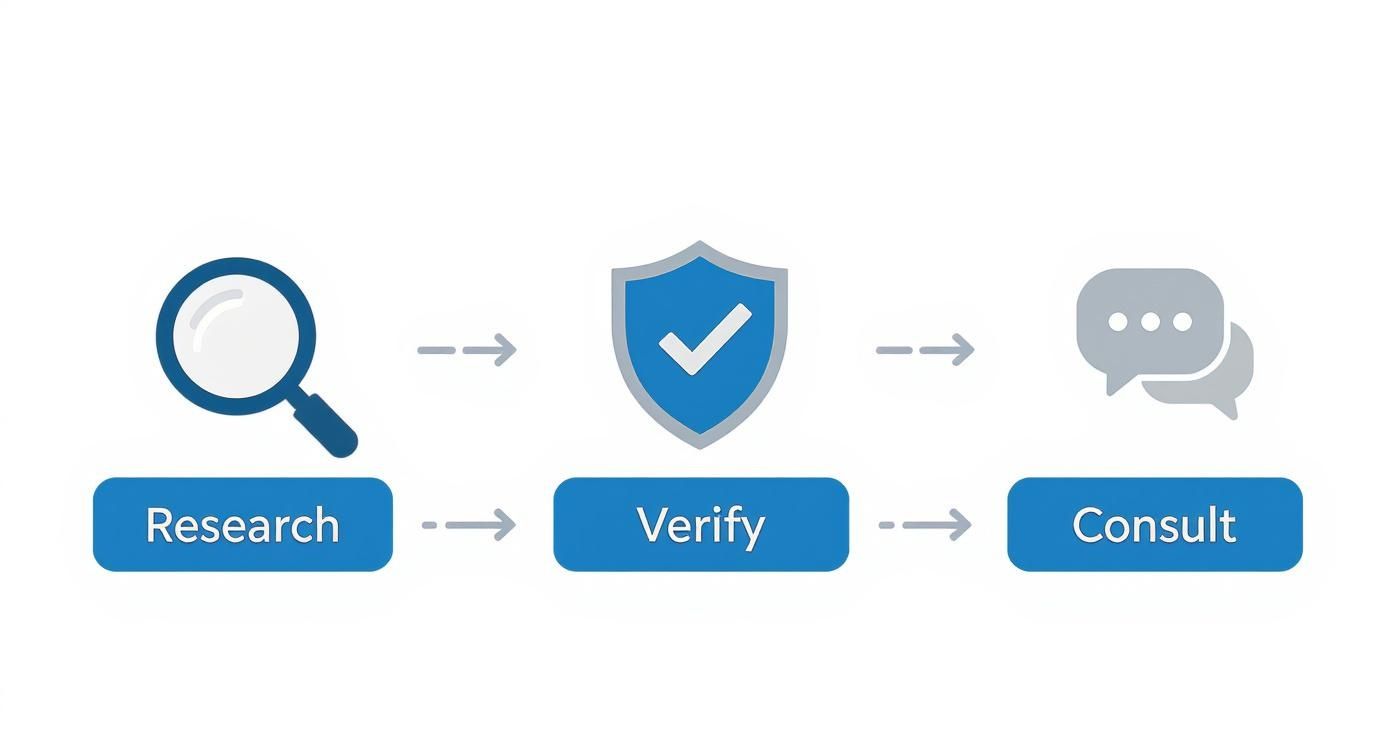Short Term Disability Lawyer Mississauga Guide
It’s a gut punch. That moment you open a letter from your insurance company and see the words “claim denied.” Suddenly, you’re not just dealing with your health—you’re facing a financial crisis, and it feels like the system is rigged against you.
When your short-term disability (STD) claim is denied, it’s not a simple misunderstanding. It’s a legal dispute. The insurance company is directly challenging your doctor’s professional opinion, and it can leave you feeling completely overwhelmed. This is precisely when bringing in an experienced short term disability lawyer in Mississauga becomes your most powerful move to get the benefits you rightfully deserve.
Why Your Mississauga STD Claim Was Denied
Think of a denial from your insurer not as a final verdict, but as their opening move in a negotiation. For anyone living and working in Mississauga, from the bustling City Centre near Square One out to Clarkson, having your claim rejected feels incredibly unfair.
The crux of the issue often comes down to one thing: the insurer has a very different definition of “disability” than your own doctor does. They employ their own medical assessors who comb through your file, searching for any loophole or inconsistency to argue that your condition isn’t severe enough to prevent you from working. Understanding how they think is the first step in building a strong counter-argument.
Common Reasons for a Denial
Insurers don’t deny claims randomly; they use specific, calculated reasons to protect their financial interests. Here are a few of the most common tactics I see:
- Insufficient Medical Evidence: They’ll say your medical records don’t paint a clear enough picture of why you can’t perform your job duties.
- Disagreement with Your Doctor: Their in-house doctor, who has never met you, will issue an opinion that you aren’t “totally disabled” according to the fine print in your policy.
- Missed Deadlines: Failing to submit a form or requested information on time is an easy reason for them to close your file.
- Pre-existing Condition Clauses: They might claim your disability is linked to a previous health issue that your policy doesn’t cover.
This isn’t a niche problem. A huge number of Canadians depend on these benefits to stay afloat. In fact, a significant portion of the Canadian workforce will experience a period of disability lasting longer than 90 days during their careers. This number really highlights why a denial is so catastrophic and why it’s so critical to push back.

An insurer’s denial is just their opinion—it’s not the final say. A skilled lawyer knows how to take apart their arguments by gathering stronger medical evidence and leveraging a deep knowledge of Ontario’s disability laws.
Getting a handle on the fundamentals is your first line of defence. To get up to speed on how the system is supposed to work, check out our guide on short term disability in Ontario explained. The more you know, the better prepared you’ll be for the fight ahead.
Red Flags That Signal You Need a Lawyer
It’s not always easy to know when to stop dealing with the insurance company on your own and bring in a lawyer. A flat-out denial letter is an obvious sign, of course. But often, the red flags pop up much earlier, hidden in subtle tactics designed to wear you down.
Learning to spot these moves is the first step in protecting yourself.
Let’s say you’re a worker in the Malton area of Mississauga, and your claim for a repetitive strain injury gets denied. The reason? Your desk job is considered “not physically demanding.” This is a classic insurer playbook move. An experienced disability lawyer near me would instantly recognize this not as a fair assessment, but as a strategy to protect the insurance company’s bottom line.

Recognizing Insurance Company Tactics
Insurance companies have a set of go-to methods for delaying, downplaying, or denying perfectly valid claims. If you’ve run into any of the situations below, it’s a pretty strong signal that it’s time to get a professional in your corner.
| Insurance Company Tactic | Why This Is a Red Flag | How a Lawyer Responds |
|---|---|---|
| Requesting the Same Information Over and Over | This creates endless delays and frustration, hoping you’ll just give up on the claim. It’s a classic stall tactic. | A lawyer takes over all communication, providing the information once in a legally clear format and demanding a decision. |
| Using Vague, Confusing Language | Correspondence filled with jargon and unclear reasons for a denial makes it almost impossible for you to know what to do next. | Your legal counsel will cut through the noise, demand specific, contract-based reasons for the decision, and challenge any ambiguity. |
| Offering a Quick, Lowball Settlement | They offer a one-time payout that’s a fraction of what your benefits are truly worth, pressuring you to take it and walk away. | A lawyer calculates the full value of your claim, advises you against accepting an unfair offer, and negotiates from a position of strength. |
| Hiring Surveillance | While less frequent for short-term claims, they might hire investigators to watch you, hoping to find evidence to use against you. | A lawyer informs you of your rights, advises you on how to handle potential surveillance, and fights back against misinterpretations. |
These tactics aren’t just frustrating; they’re calculated. At the end of the day, an insurance company answers to its shareholders, not necessarily its policyholders. Their goal is often to minimise payouts.
An insurance company’s job is to manage financial risk for its shareholders. Your lawyer’s only job is to protect your rights and fight for you. That’s why having an advocate who works exclusively for you is so crucial.
The second you start to feel overwhelmed or get the sense your insurer isn’t playing fair, it’s time to get a legal opinion. Understanding what to look for and exploring your options will ensure your rights are protected every step of the way.
Finding the Right Disability Lawyer in Mississauga
When you’re dealing with a health issue, the last thing you need is a long, drawn-out search for a lawyer. Finding the right short term disability lawyer in Mississauga isn’t just about a quick Google search; it’s about finding a true specialist who lives and breathes this area of law.
Plenty of law firms are generalists, handling everything from real estate to family law. But you need someone whose practice is laser-focused on disability insurance claims. This kind of specialisation gives them an insider’s understanding of the tactics insurance companies use and the medical details that will make or break your case.
Doing Your Homework: Credentials and Experience
Before you pick up the phone, do a little digging. The first, non-negotiable step is to check the lawyer’s credentials with the Law Society of Ontario. Their public directory lets you confirm that any lawyer you’re considering is licensed and in good standing—it’s a simple check that offers huge peace of mind.
It’s also worth noting that top-tier firms that utilize robust legal intake services often provide a smoother client experience right from the start. A professional and organised first contact is usually a good sign of how they run their entire practice.
One of the most telling things you can learn is a lawyer’s specific history with your insurance company. Don’t hesitate to ask about this directly—their answer will speak volumes.
Questions to Ask During Your First Meeting
Think of the initial consultation as an interview where you are the one hiring. You need to walk away feeling confident in their skills and comfortable with them as a person. Arm yourself with a list of direct questions to get the answers you need.
Here’s what I recommend asking:
- Experience with Your Insurer: “How many files have you successfully handled against Manulife?” (or whichever your insurer is).
- Focus Area: “Roughly what percentage of your caseload is dedicated to disability claims like mine?”
- How They Get Paid: “Do you work on a contingency basis? Can you walk me through your fee percentage and any other costs I should know about?”
- Initial Thoughts: “From what you’ve heard so far, what’s your gut feeling about my case and how would you approach it?”
- Keeping in Touch: “Will you be my main contact? How often should I expect to hear from you with updates?”
Ultimately, choosing the right legal partner in Mississauga or the surrounding GTA goes beyond a simple win-loss record. You’re looking for an advocate who will guide you through this mess with confidence and support. Since disability issues can sometimes overlap with other workplace problems, our guide on selecting an employment lawyer in Mississauga might also have some helpful tips for you.
Navigating the Ontario Disability Claim Process
Hiring a short-term disability lawyer in Mississauga instantly changes the game. That overwhelming legal maze transforms into a clear, manageable path forward. You’re no longer battling the insurance company on your own; your lawyer steps in and handles all communication, which immediately shifts the dynamic in your favour.
The journey to appeal a denial in Ontario isn’t as simple as writing a letter. It kicks off with a formal Statement of Claim. This is a serious legal document, filed with the court and served to the insurer, which officially launches a lawsuit. It lays out the facts of your case, pinpoints why the denial was unjustified, and demands the benefits you’re rightfully owed. This move makes it crystal clear to the insurance company that you mean business.
The Discovery and Mediation Phases
From there, we enter what’s known as the ‘discovery’ phase. Think of it as a mandatory show-and-tell, where both sides must lay all their cards on the table. Your lawyer will compile and present your complete medical records, and in return, the insurer has to hand over their internal files and assessments—including the reports from the doctors they hired to justify denying your claim.
I’ve seen this play out many times. For instance, a client from Streetsville had her chronic fatigue claim denied. During discovery, we got our hands on the insurer’s internal medical review, which completely minimised the debilitating symptoms her own family doctor and specialists had meticulously documented. That single piece of evidence became the cornerstone of our counter-argument.
This exchange of information often paves the way for the most critical stage: mediation.
Let’s be clear: a dramatic courtroom trial is incredibly rare in these cases. In Ontario, well over 90% of disability insurance lawsuits are settled through negotiation or mediation long before a judge ever gets involved.
This infographic breaks down the initial steps of getting the right legal expert on your side.

The real objective is to negotiate a fair, lump-sum settlement that gives you financial stability so you can put your energy where it belongs: on your health. If you’re just starting out, our guide explains how to apply for disability benefits and what you can expect.
Gathering Evidence to Build a Winning Case

A successful disability claim isn’t just about having a doctor’s note; it’s about building an ironclad case. Your short term disability lawyer in Mississauga will work to construct an argument so thorough that it gives the insurance company very little room to push back.
To do this, we need to paint a complete picture of your condition and how it genuinely impacts your life. This means gathering every relevant piece of medical information.
- Complete Medical Records: This includes notes from your family doctor and any specialists you’ve seen.
- Specialist Reports: Reports from physiotherapists, psychologists, or other practitioners are critical.
- Diagnostic Results: Things like MRIs, CT scans, and other test results provide objective proof.
It’s incredibly helpful if you can organize your medical records effectively before meeting with a lawyer, as it helps us pinpoint the most crucial information right away.
Beyond the Doctor’s Office
While medical data forms the foundation of your claim, it doesn’t tell the whole story. The human element—your personal experience—is what brings the evidence to life and makes your situation understandable.
This is why keeping a personal journal is one of the most powerful things you can do. Documenting your daily struggles creates a compelling narrative. Note how your symptoms affect your ability to do everyday things, whether it’s the difficulty of carrying groceries from the local Longo’s in Port Credit or not being able to sit through a movie at Cineplex Cinemas Mississauga. These specific details matter.
Your lawyer’s job is to translate your lived experience into a legal argument. The more detailed your personal records are, the stronger that argument becomes.
Sometimes, we might also bring in a vocational expert. This professional can offer an independent, expert opinion on your specific job duties and explain exactly why your condition prevents you from performing them.
By actively participating in gathering this evidence, you become a key player in building a case the insurance company can’t ignore. This foundational work is essential for both short and long-term claims. You can learn more about what qualifies for long-term disability on our blog.
Your Top Questions About STD Claims in Mississauga Answered
When your short-term disability claim is denied, it’s easy to feel lost and overwhelmed. But you’re not alone. Many people in Mississauga have been in your shoes, and getting straight answers is the first step to getting back on track.
What’s This Going to Cost Me?
This is usually the first question people ask, and the answer is a relief. Nearly every short term disability lawyer in Mississauga works on a contingency fee basis.
What does that mean for you? You don’t pay a dime in legal fees unless your lawyer wins your case. Their payment is simply an agreed-upon percentage of the settlement they secure on your behalf. If they don’t win, you owe them nothing. It’s that simple.
My Benefits Were Cut Off Early. Can I Do Anything?
Absolutely, and you should. Insurance companies often approve benefits for a few weeks or months, only to abruptly cut them off, insisting you’re ready to go back to work. This is a common tactic, not a final decision.
An experienced lawyer knows how to counter this. They’ll work with your doctors to gather compelling medical evidence that proves you’re still unable to work and require ongoing support.
Don’t make the mistake of thinking the insurer’s decision is the end of the road. In Ontario, you have a legal right to challenge any denial or early termination of your benefits.
Is There a Deadline to Sue My Insurer in Ontario?
Yes, and it’s a critical one. In Ontario, the law sets a strict time limit for taking legal action, known as a limitation period.
Generally, you have two years from the day your benefits were first denied or terminated to file a lawsuit. If you miss this deadline, you could permanently lose your right to fight for the money you’re owed.
At UL Lawyers, we see firsthand the stress and uncertainty a denied claim causes. You don’t have to face the insurance company by yourself. We serve clients across Mississauga and the entire GTA from our Burlington, Ontario office. We’re here to explain your options with a free, no-pressure consultation. Contact us today to get the dedicated advocacy you deserve at https://ullaw.ca.
Related Resources
How to Qualify for the Disability Tax Credit in Canada: 2026 Guide
Continue reading How to Qualify for the Disability Tax Credit in Canada: 2026 GuideYour Guide to the Canada Pension Plan Disability Pension
Continue reading Your Guide to the Canada Pension Plan Disability PensionNEED A LAWYER?
We are here 24/7 to address your case. You can speak with a lawyer to request a consultation.
905-744-8888GET STARTED WITH A FREE CONSULTATION
Why Choose UL Lawyers
- Decades of combined experience
- Millions recovered for our clients
- No fee unless we win your case
- 24/7 client support
- Personalized legal strategies